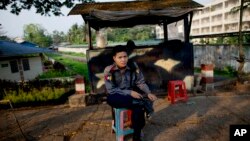The Burmese governent as publically acknowlegded that spreading tensions between Buddhists and Muslims are threatening democratic reforms.
The warning, broadcast on national television late Monday, came after a week of deadly clashes between Buddhists and Muslims spread from central Burma, raising fears of a wider religious conflict. On Friday, President Thein Sein declared a state of emergency Friday in Meiktila and nearby townships south of Mandalay, asking the army to help quell the violence.
The military restored order to Meiktila, but Buddhist mobs later burned mosques and homes in towns further south. Fears of unrest spreading to the former capital, Rangoon, prompted some shop owners to close their doors early.
Ko Ko Hlaing, chief political advisor to the president of Burma, acknowledged problems with Buddhist extremists in Burma in an interview with VOA.
"Yes, there's some very extremist elements in the Buddhist societies," he said. "But, now many prominent Buddhists, senior monks they are coming to the sites of the events and, along with the religious leaders from the Muslim communities, to settle this dispute peacefully."
The bloodshed began last week with a dispute in Meiktila between a Muslim gold shop owner and a Buddhist customer that escalated into street fighting and looting.
Authorities initially downplayed the religious divisions and portrayed the incident as rioting and looting. But after a monk was killed, mobs of Buddhists, armed with knives and clubs, ransacked Muslim neighborhoods, set fire to mosques, and burned homes.
Some journalists who attempted to video tape and photograph the violence were threatened by monks wielding knives.
Too few of Burma's majority Buddhists are willing to challenge extremist views from some religious leaders, said Matthew Walton, professor of political science at George Washington University.
"Particularly when monks are out and leading, it can be very hard for people to resist or to criticize this argument that you have to protect Buddhism and, that to do it, you have to commit some sort of violence or discriminate against a certain community."
Walton added Muslims are one group that has historically been targeted as scapegoats in Burma when feelings of insecurity arise. And, with the country's dramatic changes, he said many are uncertain about the future and looking for someone to blame.
"We can see their lack of awareness in the fact that they give credence to these rumors or fears of, you know, a sort of Muslim expansion or Islamic extremism in the country where we really see virtually not evidence of any of that," Walton said. "And, the idea that Islam poses a threat to Buddhism in Myanmar, you know, seems almost laughable to most of us who have spent a lot of time in the country."
The anti-Muslim rioting follows communal violence last year in western Rakhine state. Fighting between Muslims and Rakhine Buddhists left close to 200 dead and 120,000 displaced, the vast majority of them stateless Rohingya Muslims.
Since last year's clashes, extremists on both sides have been spreading propaganda and encouraging divisions mostly through online campaigns.
Min Zaw Oo, with the Myanmar Peace Center, said authorities are struggling with how to deal with hate speech as there are no specific laws against it.
"From the government perspective, it… has become a real hard choice: Whether to tackle these groups and be accused as suppressing freedom of expression. But, at the same time, letting them do what they are doing may somewhat incite the religious and ethnic animosity. "
Despite the religious tensions, there have been some signs of goodwill between Buddhist and Muslim communities. Some senior monks have called for religious tolerance and have actively helped Muslims displaced by the recent violence.
Burma authorities have also pledged to hold talks to try to rebuild trust between the communities.
The warning, broadcast on national television late Monday, came after a week of deadly clashes between Buddhists and Muslims spread from central Burma, raising fears of a wider religious conflict. On Friday, President Thein Sein declared a state of emergency Friday in Meiktila and nearby townships south of Mandalay, asking the army to help quell the violence.
The military restored order to Meiktila, but Buddhist mobs later burned mosques and homes in towns further south. Fears of unrest spreading to the former capital, Rangoon, prompted some shop owners to close their doors early.
Ko Ko Hlaing, chief political advisor to the president of Burma, acknowledged problems with Buddhist extremists in Burma in an interview with VOA.
"Yes, there's some very extremist elements in the Buddhist societies," he said. "But, now many prominent Buddhists, senior monks they are coming to the sites of the events and, along with the religious leaders from the Muslim communities, to settle this dispute peacefully."
The bloodshed began last week with a dispute in Meiktila between a Muslim gold shop owner and a Buddhist customer that escalated into street fighting and looting.
Authorities initially downplayed the religious divisions and portrayed the incident as rioting and looting. But after a monk was killed, mobs of Buddhists, armed with knives and clubs, ransacked Muslim neighborhoods, set fire to mosques, and burned homes.
Some journalists who attempted to video tape and photograph the violence were threatened by monks wielding knives.
Too few of Burma's majority Buddhists are willing to challenge extremist views from some religious leaders, said Matthew Walton, professor of political science at George Washington University.
"Particularly when monks are out and leading, it can be very hard for people to resist or to criticize this argument that you have to protect Buddhism and, that to do it, you have to commit some sort of violence or discriminate against a certain community."
Walton added Muslims are one group that has historically been targeted as scapegoats in Burma when feelings of insecurity arise. And, with the country's dramatic changes, he said many are uncertain about the future and looking for someone to blame.
"We can see their lack of awareness in the fact that they give credence to these rumors or fears of, you know, a sort of Muslim expansion or Islamic extremism in the country where we really see virtually not evidence of any of that," Walton said. "And, the idea that Islam poses a threat to Buddhism in Myanmar, you know, seems almost laughable to most of us who have spent a lot of time in the country."
The anti-Muslim rioting follows communal violence last year in western Rakhine state. Fighting between Muslims and Rakhine Buddhists left close to 200 dead and 120,000 displaced, the vast majority of them stateless Rohingya Muslims.
Since last year's clashes, extremists on both sides have been spreading propaganda and encouraging divisions mostly through online campaigns.
Min Zaw Oo, with the Myanmar Peace Center, said authorities are struggling with how to deal with hate speech as there are no specific laws against it.
"From the government perspective, it… has become a real hard choice: Whether to tackle these groups and be accused as suppressing freedom of expression. But, at the same time, letting them do what they are doing may somewhat incite the religious and ethnic animosity. "
Despite the religious tensions, there have been some signs of goodwill between Buddhist and Muslim communities. Some senior monks have called for religious tolerance and have actively helped Muslims displaced by the recent violence.
Burma authorities have also pledged to hold talks to try to rebuild trust between the communities.





